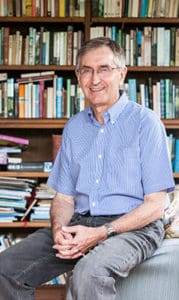 Brian Broom – MBChB, FRACP, MSc (Immunology), MNZAP
Brian Broom – MBChB, FRACP, MSc (Immunology), MNZAPBrian Broom has been described as a ‘philosopher physician,’ with a passion for ‘whole person’ approaches to physical illness and disease.
In 1987 he set up a multidisciplinary centre in Christchurch, New Zealand, oriented to whole person care. In his own personal work he combined immunology and psychotherapy practices, and began to see rich associations between patients‘ life experiences and their physical disorders, and began a long exploration of both the practical and theoretical implications of this, giving rise to the medicine and story approach to physical illness.
On the ‘body’ side he is currently a Consultant Physician in Clinical Immunology (Auckland City Hospital, New Zealand), and is consulted for many types of physical illness by people wanting a clinician who will look at both physical and non-physical factors that may be playing a part in the onset and continuation of their illnesses. On the ‘mind’ side he is a New Zealand-registered psychotherapist and has a large experience training and supervising psychotherapists. For many years he has supervised groups of psychotherapists working with patients with physical conditions. Whilst his psychotherapy background is eclectic, his therapeutic focus is strongly interpersonal.
He is Adjunct Professor in the Department of Psychotherapy at AUT University, Auckland, where he established the Post-Graduate MindBody Healthcare Diploma and Masters programme, which continues to train experienced clinicians in whole person healthcare.
He has written two books for clinicians, which demonstrate how the emergence and progression of illness and disease frequently relate very closely to the person’s personal life story. He is editor (and chapter author) of a third book, in which he and seventeen other experienced clinicians describe in unique, helpful, and often poignant detail their journey towards and transformation into whole person-oriented clinicians. See Publications.
Amongst numerous other articles he has developed a co-emergence model for understanding how life experiences, meanings and illnesses are inevitably entwined, and the importance of taking an illness meanings approach to many disease conditions, especially those that are chronic:
Broom, B. C., R. J. Booth, et al. (2012). “Symbolic illness and ‘mindbody’ co-emergence. A challenge for psychoneuroimmunology.” Explore 8 (No 1, January/February): 16-25. See article
Dr Broom has lectured, and conducted many seminars and workshops in Australia, New Zealand, Europe, UK and USA. In 2015 he was finalist for Senior New Zealander of the Year in recognition of this work. Other awards include winning the Medical Research Council (NZ) Training Fellowship in Clinical Immunology (1971-5), and the Ashton Wylie Book Award, 2007, for his book Meaning-Full Disease.
He lives in Auckland, is married to Alison, to whom he owes a huge debt for her love and support through the years of these developments. He has two living adult children, and six grandchildren. His daughter Sarah tragically died of lung cancer in 2013. This was devastating at many levels, including the complex personal challenges it constituted at the professional level. This website, and the tool ILLNESS EXPLORER, are thus not offered lightly, but as an important dimension of help for people struggling with the often reductive modes of care available to them in modern healthcare systems, and in which this dimension is missing.
His interests and preoccupations include family, boating, planting the garden, reading indigestible books, walking, the companionship of young and not so young colleagues (variably) interested in ‘whole person’ approaches, the rich mystery of life in all its bright and dark hues, deep-ish conversations with like-minded colleagues and friends, and the power of love, astute listening, compassion, warm relationship, intimate and authentic dialogue, good intention, openness, willingness to go near the edge, and serendipitous, mysterious and spiritual happenings, to not only make that special difference to daily life but also to heal the sick. And beyond this website a fourth book is beckoning.
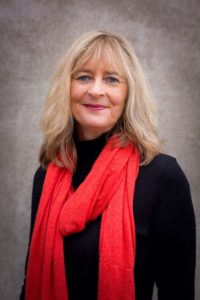 Josie Goulding MHSc (Hons) PG Dip Sexual Health Counselling, Dip Psychotherapy, Dip Nursing.
Josie Goulding MHSc (Hons) PG Dip Sexual Health Counselling, Dip Psychotherapy, Dip Nursing.Senior Lecturer – Psychotherapy and Counselling, School of Public Health & Psychosocial Studies (HY), AUT University, Auckland, New Zealand
I am a registered psychotherapist and a member of New Zealand Association of Psychotherapists. I have been in practice as a psychotherapist for 24 years with a diversity of experience in both the public and private sectors. My special areas of interest are in MindBody Healthcare, in which a whole person approach is taken to people seeking help. I have interest and experience in working with people sexuality and gender issues as well as providing general psychotherapy, for example with people suffering anxiety and depression.
I teach on the MindBody Healthcare and Psychotherapy Masters programmes at AUT University.
My latest publications are :
Goulding, J. M. (2013). Training “troops” for a MindBody revolution. In B. Broom (Ed.), Transforming Clinical Practice using the MindBody Approach: A Radical Integration (pp. 275-298). London, United Kingdom: Karnac Books.
Solomon, M. P., & Goulding, J. (2013). Unsettling a way of being: Therapeutic interventions with patients with Chronic Spontaneous Urticaria. In H. Wiseman (Ed.), Book of abstracts:Society for Psychotherapy Research 44th International Annual Meeting. Brisbane, Queensland, Australia.
Tudor, K., Cockburn, G., Daniels, J., Goulding, J., Hubbard, P., Larsen, S., . . . Stuthridge, J. (2013). Reflexive theory: Critical reflections on Western psychotherapy. Ata: Journal of Psychotherapy Aotearoa New Zealand, 17(1), 27-54.
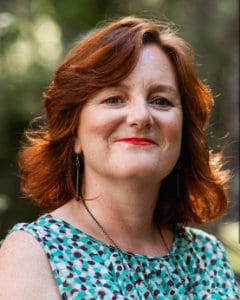 UK trained Rheumatologist and New Zealand-trained Clinical Immunologist, Lecturer at AUT University on the MindBody Healthcare Post-Graduate Programme, Consultant at Auckland City Hospital
UK trained Rheumatologist and New Zealand-trained Clinical Immunologist, Lecturer at AUT University on the MindBody Healthcare Post-Graduate Programme, Consultant at Auckland City Hospital
As a doctor, since doing the MindBody Healthcare Programme in 2012, I have been integrating a whole person perspective into my day-to-day work as a specialist at Auckland City Hospital in diverse areas like rheumatology, immunology and ophthalmology. Learning directly from patients, both how and why people get ill, how they express dis-ease and helping them use their innate strengths and capacities to heal is fascinating and directly satisfies the curiosity that took me into medicine. I have deconstructed my biomedical dualistic perspective in favour of more of a choice of different philosophical and therapeutic lenses to assist my patients. I can be helpful when a purely biomedical approach is being unsuccessful either due to poor engagement or when people simply don’t feel heard and for those who don’t fit into neat diagnostic categories. It augments the powerful tools that medicine already has and helps people find their way in the system towards a more healing experience. Not only that, it provides a coherent perspective from which to incorporate the overwhelming findings of new scientific biomedical research.
I am an occupational therapist and a university lecturer. My postgraduate studies in MindBody Healthcare, my Master’s research into contemplative educational practice, and my participation in a monthly Balint supervision group, have convinced me that in both clinical work and education relationships are crucial to best outcomes.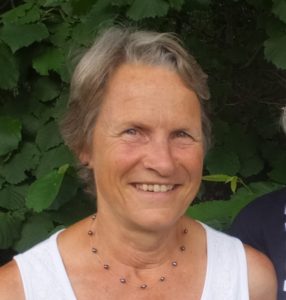
As both an occupational therapist and a MindBody or Whole Person health –oriented practitioner, I recognise that the meanings persons give to their life experiences are crucial to achieving a life worth living after illness or injury.
I recognise the limited awareness, within conventional healthcare contexts, of these meanings and emotional elements, or that addressing them can make a significant difference to well-being, recovery and rehabilitation.
A major interest for me is how mindfulness practice can support the development of awareness of these dimensions, and relevant practical skills, in both healthcare and tertiary education. My Master’s thesis, The lived experience of teaching mindfully in tertiary education. A hermeneutic phenomenological study, 2015, explored the meanings of teaching mindfully as a whole-person, relational approach in tertiary education.
For all these reasons, along with my own personal journey in matters of health and wellness, I am a passionate and committed member of the MindBody Trust, which strives to increase awareness and provide resources for whole-person healthcare to clinicians and people in the community who are seeking well-being and better health.
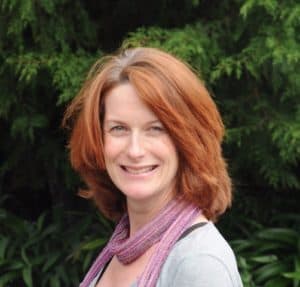 Susan is an experienced integrative musculoskeletal physiotherapist who has worked in the private sector for 20 years. In 2000, she opened her own clinic, Moving Well, and has specialized in a whole person-centred approach to pain and somatic symptoms since completing postgraduate papers in Mindbody Healthcare at AUT University, Auckland, in 2010.
Susan is an experienced integrative musculoskeletal physiotherapist who has worked in the private sector for 20 years. In 2000, she opened her own clinic, Moving Well, and has specialized in a whole person-centred approach to pain and somatic symptoms since completing postgraduate papers in Mindbody Healthcare at AUT University, Auckland, in 2010.
She integrates her knowledge of breathing and mindfulness into her physiotherapy sessions, and creates a space for her patients to “slow down and notice” what the body is trying to tell us.
Susan has a special interest in complex presentations, particularly headaches, neck, back, pelvic and abdominal pain, fatigue-related symptoms, and breathing pattern disorders. She is a guest speaker on the Breathing, Performance and Rehabilitation post-graduate paper at AUT University, and wrote a chapter titled Touching the Hurt for the book Transforming Clinical Practice using the Mindbody Approach (Karnac, 2013).
She is proud of creating a physiotherapy practice with a difference and being a mother to her young daughter.
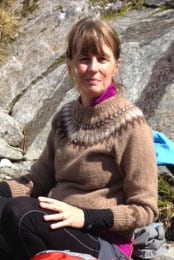 Hello, my name is Janette Tolich. I completed my pos-graduate diploma in MindBody Healthcare practice in 2014; I graduated as a physiotherapist when I was 19 and am still committed to providing a way of moving for people who struggle due to illness or disability. I have been teaching in the BHSc programme for physiotherapy AUT University for many years now and am inspired by the willingness and openness of our students who truly want to make a difference.
Hello, my name is Janette Tolich. I completed my pos-graduate diploma in MindBody Healthcare practice in 2014; I graduated as a physiotherapist when I was 19 and am still committed to providing a way of moving for people who struggle due to illness or disability. I have been teaching in the BHSc programme for physiotherapy AUT University for many years now and am inspired by the willingness and openness of our students who truly want to make a difference.
My specific MindBody approach to whole person wellness comes from a passion to integrate the advances of biomedicine and re-establish them within a “soulful’ place, by explicitly witnessing and giving language to the meaning of personal story, and no longer tolerating the separation of mind, body and spirit.
I endeavour to promote within my clinical students a way of allowing ‘whole person’ witnessing, allowing subjectivity its full place, and promoting a legitimate way of doing this within the existing framework of our traditional healthcare model in NZ.
In my clinical teaching role I co-ordinate and manage a Breathing & Living rehabilitation clinic for the clinical placements in cardio-respiratory physiotherapy as part of the Akoranga Integrated Health Clinic, AUT University , North Shore Campus. I also promote, support and manage inter-professional learning programmes for students across all faculties of the School of Clinical Sciences, AUT University, and, wider, including University of Auckland and Massey University students and educators.
As part of my wish to practice in a whole person way, I have a small private practice using a MindBody integrated approach to breathing retraining, chronic pain and illness. I am a Tai Chi practitioner and use and value this form of body/mind integration as a therapeutic tool in my practice.